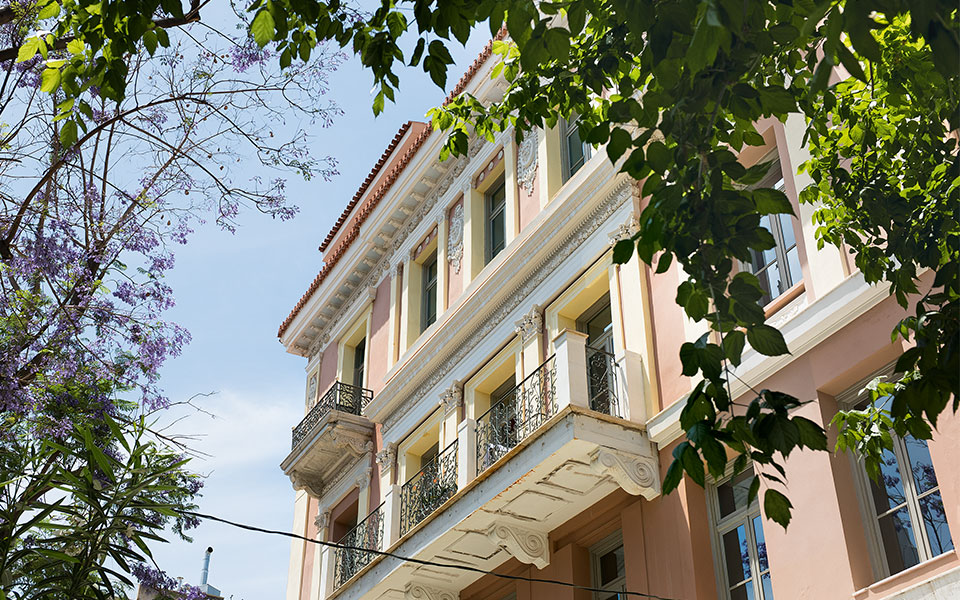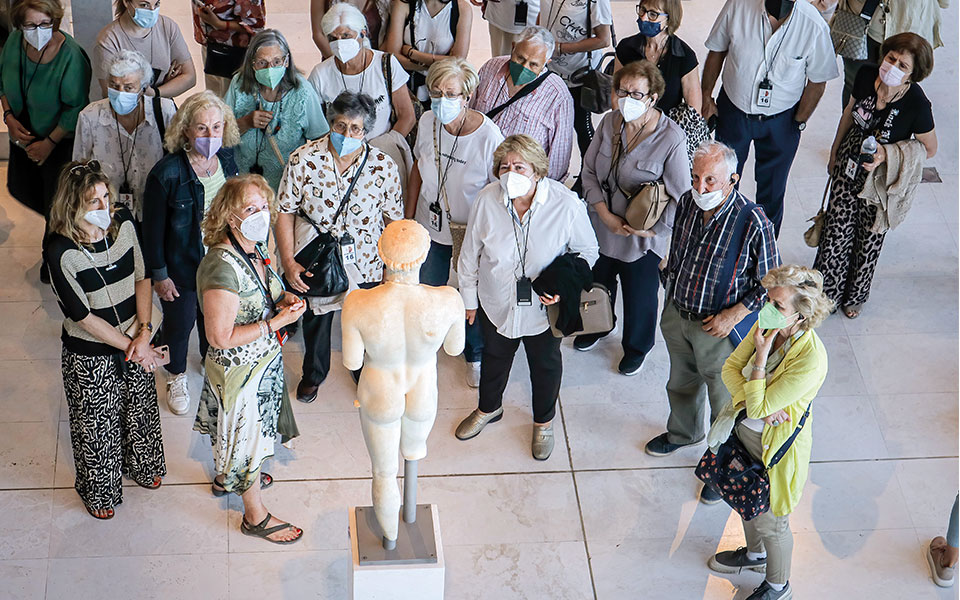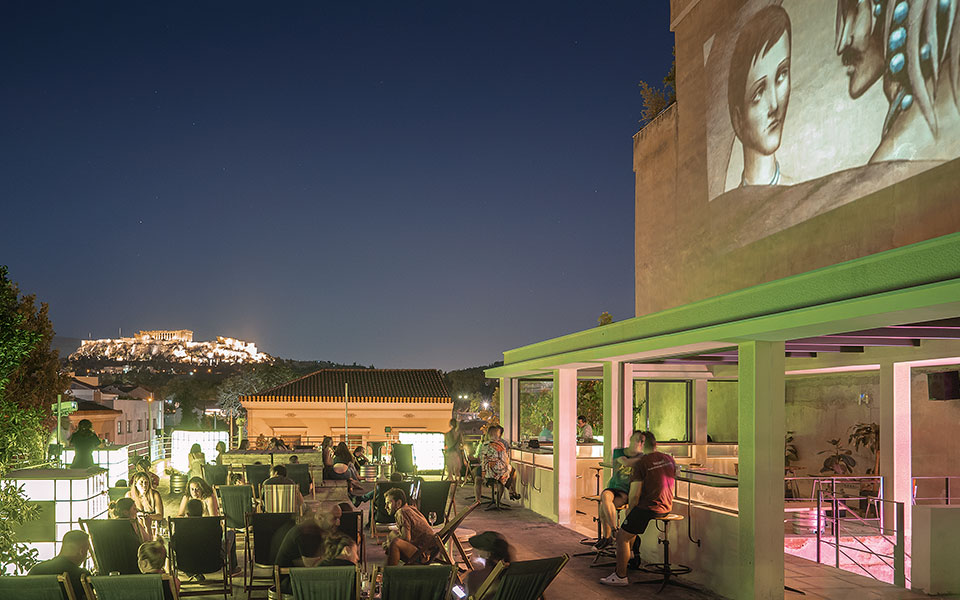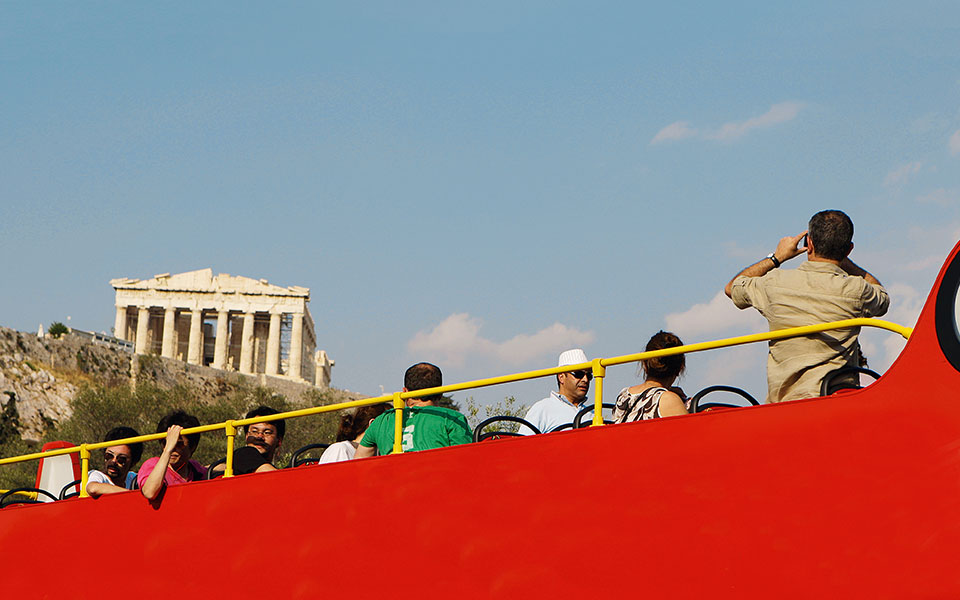Let’s say, for argument’s sake, that no one saw it coming. After all, it hadn’t been that long since Athens had been striving – quite desperately – to claim a bigger slice of the ever-growing pie of the city-breaks market. The 2010 economic crisis had done nothing to improve the image of a city in turmoil, with frequent street protests often turning violent, or to make it seem as appealing as other, more popular, European cities.
As the country fought to get back on its feet, no one was playing particularly close attention to the Greek capital’s touristic transformation, as it started getting more and more attention from international travel websites, influential magazines and, most importantly, big foreign investors. Even as the crisis stirred a wave of curiosity, the city’s hosting in 2017 of the German quinquennial art exhibition documenta produced the image of a hip urban milieu, with much to offer beyond the obligatory pilgrimage to the Parthenon. The fact that prices – from short-term rentals and hotels to the real estate market – had nosedived during the economic slump also helped. By 2019, the average length of stay in Athens rose from two to nearly six days and, the following year, the mainland region of Attica climbed from fifth to first place, overtaking popular destinations such as Crete and the Cycladic islands in terms of overnight stays.

© Vangelis Zavos
As late as the 2004 Olympic Games, Athens was still regarded merely as a requisite stopover on the way to the islands. It’s only emerged as a destination in its own right in the past few years, and has suddenly exploded in popularity. The pandemic may have slowed things temporarily, but down in the belly of the ship the engine never stopped churning. New tourist accommodations are proliferating, as entire apartment buildings are being snatched up by foreign investors and transformed within months into rooms, condos, and serviced apartments for both short- and long-term stays. Major hotel chains have started opening locations, and a string of ambitious urban-rejuvenation projects, including the development of the old airport into the Hellinikon Metropolitan Park, a public green space with luxury villas by the sea, are bolstering the momentum.

© Getty Images/Ideal Image
Love it or leave it
This is one side of the coin. Athenian Giorgos Zafeiriou, who lives in the historic district of Plaka, describes the dark side: “The situation has become desperate. We can’t leave our homes, we can’t sleep, we can’t live our lives.” Like the other residents of this quaint neoclassical neighborhood at the foot of the Acropolis, he’s experiencing the unprecedented surge in visitors firsthand, after two relatively quiet pandemic years. Authorities have been reluctant to control the chaos because it’s hoped that this year’s crowds will make up for losses from the past two tourism seasons.
Zafeiriou is not the only one complaining. In 2007, Oxford University professor Stathis Kalyvas bought an apartment on a tranquil pedestrianized stretch of Aiolou Street. Located in what Athenians call the “commercial triangle,” characterized by small businesses, mom-and-pop stores, and manufacturing workshops, the area has since become practically unrecognizable. The pedestrianization of many of the streets has attracted slews of new cafés, restaurants, and hotels, to the extent that if Kalyvas had the choice today, he would not buy a house there.
“Touristification has become way too excessive, and the downtown area is being transformed into a theme park only for tourists. The worst part about all the new hotels opening in the area is that they’re turning their rooftop terraces into bars. This is a disaster for the residents here, as most of us tend to live on the higher floors, so we’re simply left with no escape,” he says.
Noise pollution is just one side effect of the rise in tourism: the burgeoning of short-term rentals is driving a significant increase in residential rental rates in downtown neighborhoods such as Koukaki, Pangrati, Thiseio, and Exarchia. In this respect, however, Athens is by no means alone. Many European cities are facing similar challenges, and the voices demanding regulation are growing louder.

© BROWN HOTELS-ROOFTOP ACROPOLIS
The Good and the Bad
Truth be told, the buzz that had slowly seeped out of dozens of streets and alleys in the stretch between Syntagma and Monastiraki has come bursting forth again in the past few years. Interventions have gone beyond the spirit of a simple pedestrianization plan, with initiatives like smart LED lighting and trash collection, the systematic cleaning of graffiti off 8,300 square meters of building facades, the introduction of anti-tagging materials, and the involvement of residents and businesses in the area. Thanks to all the investment funds pouring in, the downtown area is more attractive than ever. Beautiful interwar buildings that were being used for storage have been splendidly restored, while less attractive edifices from the period of mass construction after WWII are being given innovative makeovers and new leases on life.
Yet the unique – and very Greek – mix of property uses, social groups, and business activities is at risk of being crushed by a short-sighted development drive. And everyone seems to agree that permanent residents are no longer considered part of the scheme. It’s a significant oversight because they represent the link in the chain that keeps a neighborhood loved and looked after. With so many cafés and restaurants, hotels and Airbnbs creating noise and congestion, and the nearest schools too far away for families with young children, no one wants to live in the center anymore. The city’s mayor, Kostas Bakoyannis, believes that what we’re seeing today is Athens making up for lost ground: “Did you know that Prague welcomes more than eight million visitors a year and Athens only five and a half?”

© Dimtris Vlaikos
Favorable Winds
How many hotels can Athens take? “You’re asking the wrong question,” says Yiannis Retsos, president of the Confederation of Greek Tourism Businesses (SETE). He explains that it’s impossible to define a specific number of hotels or beds as being too many or too few for a city of Athens’ caliber in a free market. “There are simply too many variables to even assume we can control them.” So what is the right question? “Will the course of tourism be such that the investments being made now will be offset and made sustainable in the medium term? And, also, will we all – the state and institutional and private stakeholders – do what needs to be done to protect and upgrade our product? That’s the real question. I can’t speak for others, but the winds are favorable,” Retsos says.
He outlines two reasons why he’s optimistic about the city’s prospects. The first is belief in the signs showing that this decade will be one of rapid tourism growth worldwide. “An ageing population in the developed world has created an abundance of leisure, money, and a yen to travel,” Retsos says. “This trend will only be accelerated by the end of the pandemic. Speaking of Athens specifically, its tourism product is constantly being enriched and will be enriched even further in the immediate future. The work being done at Hellinikon [the former airport] will not just have an impact on the real estate market, it will also leave a strong imprint on tourism, as it will add a new scale of high-income clientele generating a whole new dynamic. International hotel brands are also positioning themselves for the ‘day after’ in the nascent market because they support the momentum of a very multilayered destination such as Athens. So we shouldn’t be surprised by the investment fever in this respect. There are the opportunists too, of course, but visitors today are much better informed than they once were and demand a customized and value-for-money experience. Investors who are simply jumping on the bandwagon will not get very far.”

On the bright side…
In Athens, you can walk from ancient monuments to modern art museums in a matter of minutes, traveling through time in an exciting contemporary city that’s home to some of history’s greatest landmarks.
The center of the city is designed for walkers –some of the most beautiful pedestrianized stretches in Europe, such as Dionysiou Areopagitou Street, skirt the city’s grandest sites.
Athens boasts more outdoor cinemas than any other European city, screening everything from blockbuster premieres to art house classics.
There are 75 rooftop bars and /or restaurants with spectacular views of the Acropolis and the city.
It’s not all old art here – in the last four years, two new museums, the National Museum of Contemporary Art (EMST) and the Basil & Elise Goulandris Foundation opened to the public, while the National Gallery reopened after extensive renovations and expansion.
The city of Athens is becoming more multicultural every day, and the new restaurants that non-native communities have opened are joining an amazing culinary scene that ranges from Michelin-starred kitchens to very inexpensive (by US and European standards) but outstanding neighborhood eateries, serving authentic local cuisine in traditional surroundings.
A five-day public transport pass costs just €9, among the cheapest in Europe, and the network is far-reaching, but if you need a taxi, cab fares are also remarkably inexpensive, with a starting minimum rate of just €4.
Athens stays up very late, which gives you more time to enjoy the nightlife in one of Europe’s safest cities. The capital is home to two of the most acclaimed bars in the world, The Clumsies and Baba Au Rum.
Athens is a seaside city surrounded by mountains. Just 20 minutes away by car are both amazing beaches and lush green forests where summer temperatures are 5-7 degrees cooler than in the city center.
Beautiful islands are just a short boat-ride away: Hydra, Aegina, Spetses, Tzia (Kea) or Syros.
Some of the most important sites of the ancient world are within a few hours’ drive: Delphi, Mycenae and Epidaurus.











